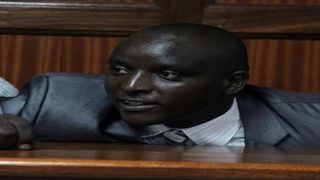
Former Ruaraka police boss Nahashon Mutua before the High Court on February 14, 2019 after he was sentenced to death for torturing a suspect to death in a cell.
News
Premium
Court upholds death sentence on policeman in murder case
What you need to know:
- Mr Nahashon Mutua called five police officers, mostly his juniors, in his defence.
- He maintained his innocence, saying a man who had earlier been charged with the murder, was the right suspect.
Police officers are known to protect their own even when it is clear that the one being protected is on the wrong.
Even more puzzling is a move by officers to free some suspects in a bid to use them as witnesses as they frame an innocent person with offences committed by a police officer.
Described by judges of the Court of Appeal as the “blue code of silence” the phenomenon, as noted by the court, is common, spanning across different countries and police cultures.
“It is the unwritten rule; police officers never provide incriminating information about their colleagues, close ranks in silence and cover up knowledge of a fellow officer’s wrongdoing with a collective blanket of self-preservation, a feeling of esprit de corps among officers who, by and large, depend on each other for their very risky lives as they confront the violent and hostile world of policing and crime.”
But they are not always lucky as happened recently when the appellate court upheld the death sentence imposed on a former Ruaraka officer commanding station (OCS), who was found guilty of torturing a suspect to death.
Mr Nahashon Mutua called five police officers, mostly his juniors, in his defence. He maintained his innocence, saying a man who had earlier been charged with the murder, was the right suspect. The court, however noted how the concocted evidence was contradictory and inconsistent.
The officers had framed Kelvin Odhiambo with the murder of Martin Koome, who had been booked at the station for threatening the life of his child. Mr Odhiambo was arrested for failing to settle a bill after drinking.
“The contradictory and evasive nature of the evidence of the police officers who were on duty on the material night was self-serving and intended to cloud the evidence of other witnesses, to cover up any complicity on their part,” Justices Hannah Okwengu, Mohammed Warsame and Agnes Murgor said when they dismissed Mutua’s appeal.
Koome had been arrested over a domestic quarrel with his wife and was booked at the police station. The court heard that Mr Mutua descended on him immediately with beatings and immersed him in a drum full of water to allegedly sober him up.
Witnesses said they heard Koome pleading with the officer to pardon him but he continued hitting him with a blunt object while forcing him into the drum.
Big cover-up
Cell-mates, some of whom testified as protected witnesses, said they saw Mutua beating him and when he was returned to the cell, Koome was wet and bleeding. His face was swollen when he was taken to Kenyatta National Hospital. He died before he was treated.
The officers left him unattended. His wife could barely recognise him. On the fateful night of December 19, 2013, another suspect, Victor Kioko suffered the same fate and sustained broken hands.
The officers discovered something was amiss when they called out the suspects in the morning for a roll-call. Whereas other suspects came out after their names were called out, Koome and Kioko remained motionless and groaning in pain.
Then started the big cover-up, which was only discovered when the Independent Policing Oversight Authority (IPOA) investigated the matter and saved Mr Odhiambo from facing charges he never committed.
“It is inconceivable that two suspects could have sustained such serious injuries in the cells just next to the report office without the police officers who were charged with the responsibility of taking care of the prisoners, intervening and getting to the bottom of the matter,” the judges said.
Mr Odhiambo had been charged with the murder but the case was terminated and instead, Mutua was charged. He was found guilty by Justice Stella Mutuku in December 2018 but filed an appeal which was dismissed two weeks ago.
In a bid to cover his tracks, Mutua took both suspects to Neema Uhai Hospital but Koome was referred to KNH because he was seriously ill. He succumbed to the injuries as his wife and sister tried seeking for help.
The judges wondered why a senior police officer would go out of his way to visit a suspect in a hospital, pay his medical bill and drive him to his house.
“The explanation can only be as testified to by Victor, that Mutua was the one who had inflicted the injuries upon him, and the evidence of Jackson that Mutua was trying to prevail upon Victor not to pursue the matter,” the judges noted.
Jackson was Kioko’s brother who was with him as he was being treated. The former senior cop also noted that three star witnesses, identified as Ali, Tom, and Rama, to protect their identities, watched as the two were being beaten.
The judges said the three had no reason to fix Mutua. They were freed and forced to record statements, implicating Odhiambo with the murder.





